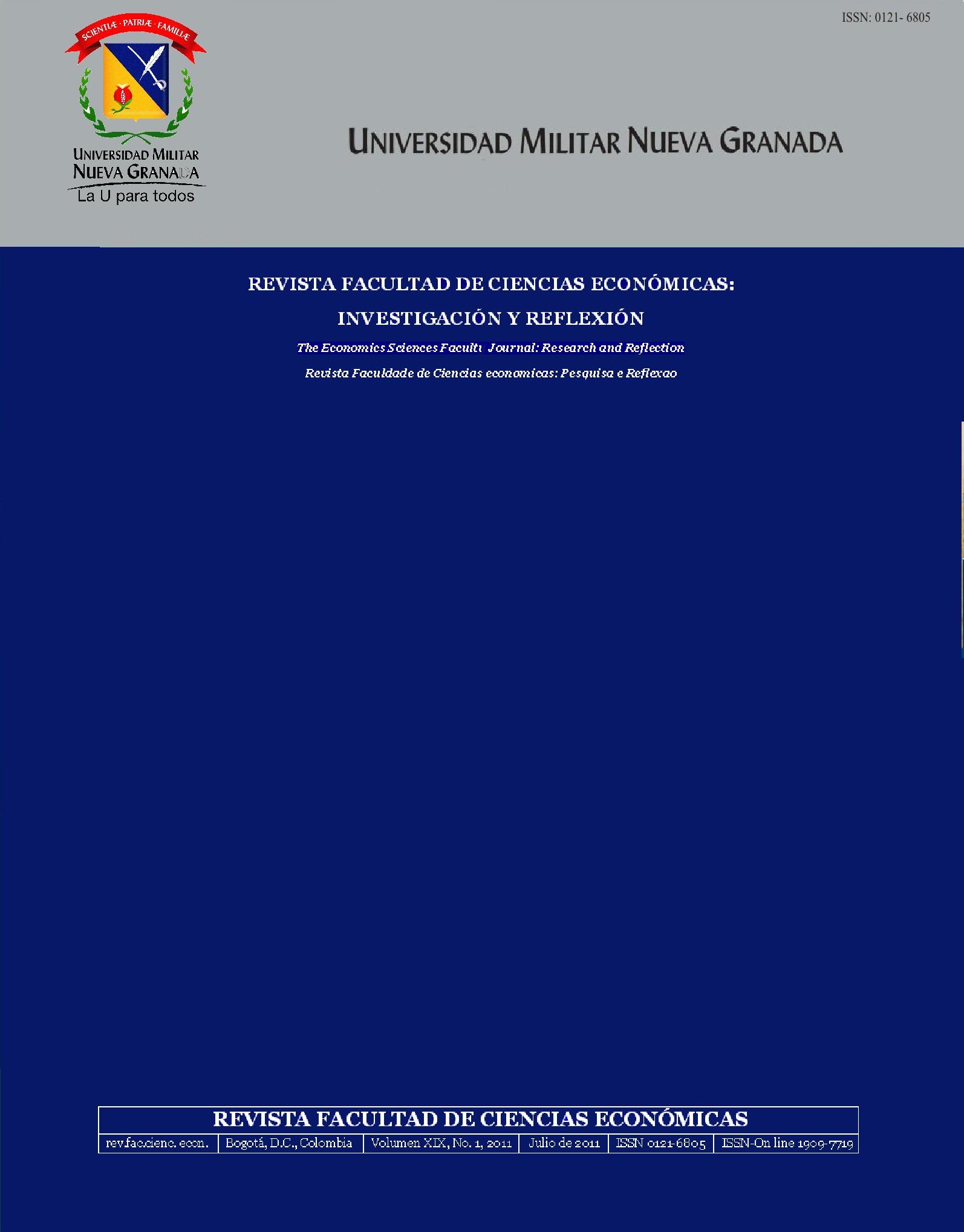Probability determinants of new enterprises closurein Bogotá
Abstract
This article analyzes the determinants of probability of closing a new firm in the market before completing five years of operation. Macroeconomic and microeconomic conditions which were experienced by those firms in Bogotá were studied. The study reveals that it can be affirmed that the optimum size of a firm to enter into the market is small and medium enterprise (SME). Main findings are, in the first place, that the enterprises most likely to premature bankrupt are micro enterprises, in second place, for some enterprises;moderate indebtedness can be useful for leverage, and finally, high indebtedness is determinant for an enterprise closure before completing its fifth year of operation.Downloads
References
Acts, Z., Armingthon, C., & Zhang, T. (Diciembre de 2006). The Determinants of New-firm Survival across Regional Economies. Papers on Entrepreneurship, Growth and Public Policy (0407) , 39. Alemania.
Agarwal, R., & Gort, M. (Abril de 1999). The determinants of firm survival. Obtenido de http://ssrn.com/abstract=167331 or DOI: 10.2139/ssrn.167331
Altman, E. (1968). Financial Ratios, Discriminant Analysis and the Prediction of Corporate Bankruptcy. Journal of Finance. http://dx.doi.org/10.1111/j.1540-6261.1968.tb00843.x
Álvarez, R., & Vergara, S. (Agosto de 2007). Sobrevivencia de Pymes en Chile: ¿Ha cambiado a través del tiempo?, ¿Difiere por industrias? Recuperado el 17 de Febrero de 2009, de Banco Central de Chile - Documentos de Trabajo: http://www.bcentral.cl/eng/studies/working-papers/pdf/dtbc427.pdf
Arias, A., & Quiroga, R. (2008). Cese de actividades de las pymes en el área metropolitana de Cali (2000-2004): Un análisis de supervivencia empresarial. Cuadernos de Administración: 249-277.
Audretsch, D., & Mahmood, T. (1995). New Firm Survival: New Results Using a Hazard Function. The Review of Economics and Statistics: 97-103. http://dx.doi.org/10.2307/2109995
Buddelmeyer, H., Jensen, P., & Webster, E. (2006). Innovation and the Determinants of Firm Survival. IZA Discussion Papers . Disponible en: ftp.iza.org/dp2386.pdf
Ericson, R., & Pakes, A. (1995). Markov-Perfect Industry Dynamics: A Framework for Empirical Works. Review of Economic Studies: 53-82. http://dx.doi.org/10.2307/2297841
Eslava, M., Haltiwanger, J., Kugler, A., & Kugler, M. (3-4 de Noviembre de 2005). Plant Survival, Market Fundamentals and Trade Liberalization. Recuperado el 21 de Enero de 2009,de www.imf.org: http://www.imf.org/external/np/res/se-minars/2005/arc/pdf/esla.pdf
Fajnzylber, P., Maloney, W., & Ribeiro, E. (2001). Firm Entry and Exit, Labor Demand and Trade Reform Evidence from Chile and Colombia. Policy Research Working Paper. Disponible: papers.ssrn.com/sol3/papers.cfm?abstract_id=632727
Jovanovic, B. (1982). Selection and the Evolution of Industry. Econometrica: 649-670. http://dx.doi.org/10.2307/1912606
López-García, P., & Puente, S. (2006). Business Demography in Spain: Determinants of Firm Survival. Documentos de Trabajo (0608) . Madrid: Banco de Espa-a. http://dx.doi.org/10.2139/ssrn.901153
Martínez, A. (2006). Determinantes de la supervivencia de empresas industriales en el área metropolitana de Cali 19942003. En: Revista Sociedad y Economía #11: 112-144.
Martínez, O. (2003). Determinantes de fragilidad en las empresas colombianas. Borradores de Economía 259. Banco de la República de Colombia.
Mata, J., & Portugal, P. (1994). Life Duration of New Firms. Journal of Industrial Economics, XLII (3): 227-245. http://dx.doi.org/10.2307/2950567
Mata, J., Geroski, P., & Portugal, P. (Enero de 2003). Founding Conditions and the Survival of New Firms. Recuperado el 17 de Febrero de 2009, de Banco de Portugal: http://www.bportugal.pt/publish/wp/2003-1.pdf
Mata, J., Geroski, P., & Portugal, P. (2007). Founding Conditions and the Survival of New Firms. DRUID Working Papers . Disponible en: http://www3.druid.dk/wp/20070011.pdf
Rosillo, J. (2002). Modelo de predicción de quiebras de las empresas colombianas. INNOVAR , No. 19: 109-124.
Schumpeter, J. (1976). Capitalism, Socialism and Democracy. New York: George Allen and Unwin Publishers.
Segarra, A., & Teruel, M. (2007). Creación y supervivencia de las nuevas empresas en las manufacturas y los servicios. Economía Industrial: 47-58.
Stone, I., Hunt, A., & Holmes, P. (2010). An Analysis of New Firm Survival using a Hazard Function. Applied Economics: 185-195.











